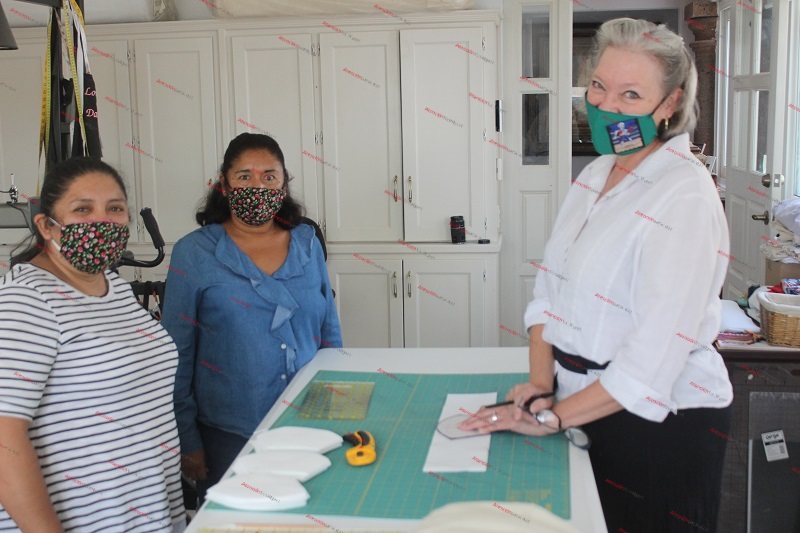Jessica Frick, a registered nurse from the United States, represents COVID-19 SMA, a non-profit group dedicated to providing accurate, up-to-date healthcare resources and information about COVID-19 to the San Miguel community. Monitored by trained healthcare professionals, the group provides valuable resources and answers questions about the virus on its website and social networks. Masks 4 U, a volunteer organization that has joined forces with COVID-19 SMA, is dedicated to providing face masks that adhere to World Health Organization guidelines. Its goal is to provide masks to the general public as well as to healthcare workers. Masks can be purchased—and donations to support the community are gratefully accepted—via the COVID-19 SMA website at www.covid19sma.com/.
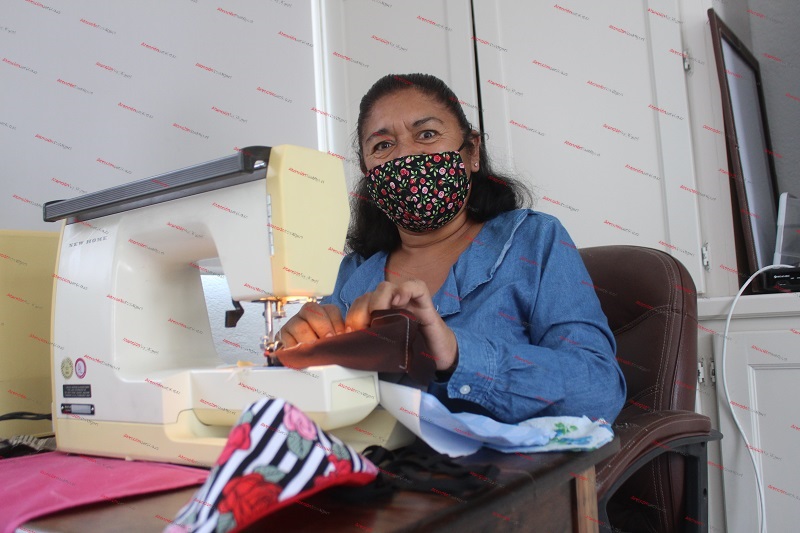
Concepción
Adriana Flores and Concepción Fuentes are two seamstresses who make costumes for the Locos parade, wedding and quinceañera gowns, and uniforms. When their work ceased because of the pandemic, they asked the obvious question—what do we do now? For Chris McCaskill and Yolanda Fuentes del Río, the answer was obvious—let’s make face masks.
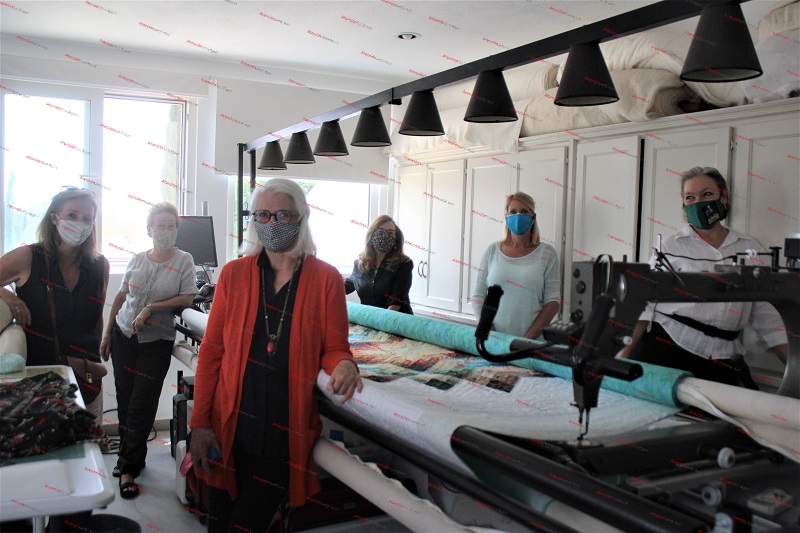
Chris, Yolanda, Jessica, Cornelia, Nataly y Sharon
Face masks for the public
Many at the Masks 4 U volunteer organization dedicate their time to cutting fabric, sewing, helping with deliveries, and obtaining supplies and donations. More than 10 local seamstresses sew the masks. Atención visited the home of McCaskill, where several of these women gather. The home has virtually been turned into a mask-making workshop. Counters and cupboard drawers have been converted into storage for pre-cut fabric pieces, mask prototypes, and mask-making sets and hold boxes of packaged, completed face masks ready for delivery.
Joining McCaskill and Fuentes were Concepción Fuentes, Sharon Welborn, Jessica Frick, Cornelia Ulrich, Natalie Taylor, and Adriana Flores. They are united in one purpose—to produce the greatest number of face masks, which they give away to Sanmiguelenses in an effort to stop the spread of COVID-19. On the second floor of the house is a huge quilting machine, which was stacked with mask samples. Welborn, who was cutting fabric for masks, explained the current World Health Organization (WHO) content recommendations: an outer layer of polyester, a middle layer of polypropylene, and an inner layer of cotton. Yolanda Fuentes, wearing a face mask that matched her skirt, explained how the project came about and noted that they have delivered more than 12,000 face masks to date. She said, “Chris and I are very close friends; we are dedicated to textile art. On February 3 of this year, I returned from the United States. On the 4th, I started to make face masks to give to our friends. We began to experiment; we had never made them. We thought, why not do this to give them to the public? This is how we started this project on March 15. We met; we called friends who have nothing to do with sewing or quilting but have a lot of heart to help. We started; we distributed the work. We all brought our fabrics,” she added as she opened drawers to show them to us. She explained that the fabrics come from the United States because the material recommended by the WHO is difficult to find here. Buying online is problematic because there is not sufficient quantity or the product is sold out. She hopes to be able to go to the U.S. soon and stock up on more fabric.
Designing and making the masks went through several phases. The initial prototypes were made only with cotton, with a pocket for a filter. This changed to polyester, polypropylene, and cotton layers. The lengths of the elastics and the sizes of the masks have undergone changes as well, always following WHO standards. Unfortunately, at present, they are facing a shortage of fabric, elastic, and good-quality cotton.
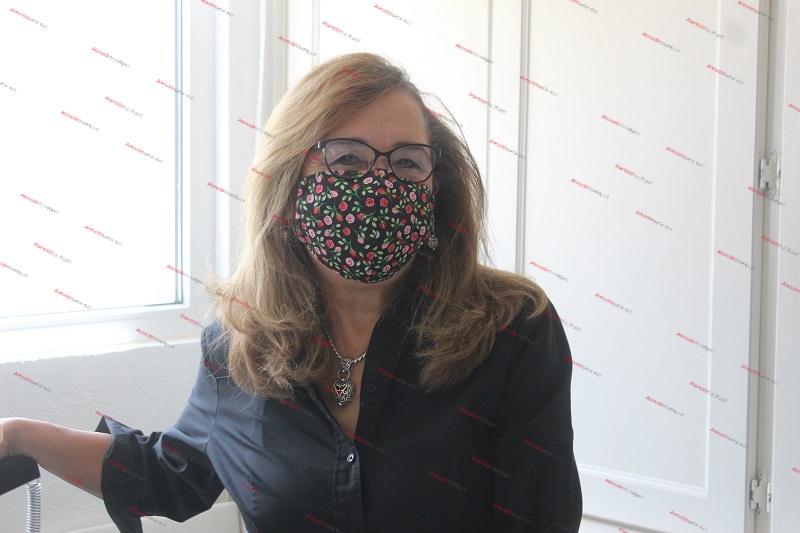
Yolanda Fuentes
Who are the seamstresses?
As demand for face masks became overwhelming, local seamstresses were contracted to do the work. Concepción Fuentes and Adriana Flores are two of the more than 10 local seamstresses who are producing the masks. On the day we visited, they showed us how quickly and efficiently they are able to sew the masks. Approximately eight years ago the two were interviewed by Atención when they were working in a family cooperative. They had eight or ten sewing and embroidery machines and were assembling school and business uniforms in large quantities. According to Flores, the business fell apart because of inefficient administration, which brought about losses. About three years ago, the cooperative decided to distribute the sewing machines, irons, and other devices among the members of the cooperative.
Flores received her mother’s equipment, and another set went to her sister. They continued working, but when the pandemic began, everything was suspended—the costumes for the spring parade, the costumes for the Locos parade, and graduation dresses. There was no work.
Fuentes told us that she and her husband lost their jobs, and her son lost his job at a movie theater. So, the question became what to do? They did not want to end up asking for jobs or money for food on the street, like some neighbors were doing. The opportunity from Masks 4 U arrived at the right time. Now the group produces up to 800 masks weekly, which go to those who need them most.
Fuentes and Flores laughed when they told us how the first designs now seem so strange. They were learning. Now they are sure of the quality, and they know that each mask carries a bit of hope when it’s given away. Like all the other women involved, they believe that if one of their products saves a life, then the mission of Masks 4 U has been accomplished.
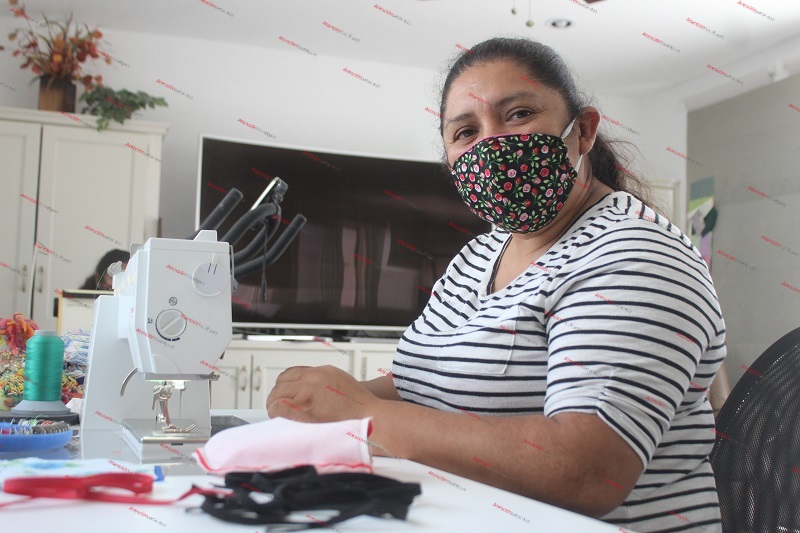
Adriana Fuentes
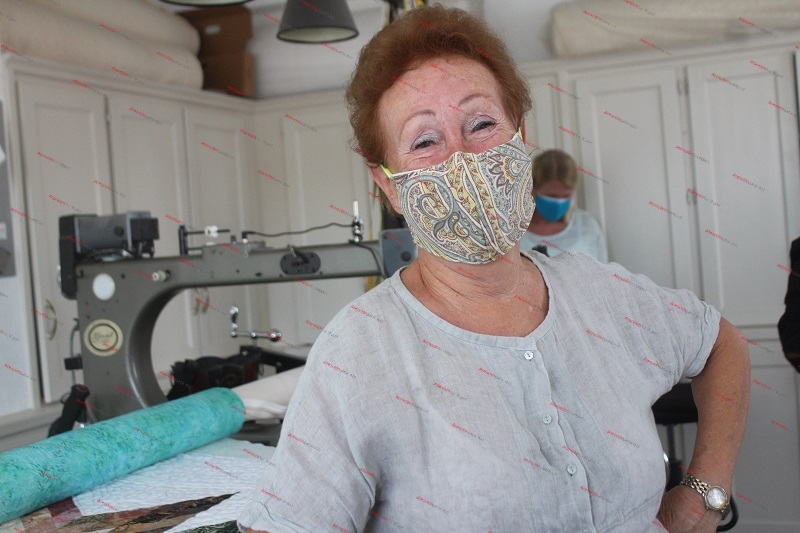
Nataly Taylor

